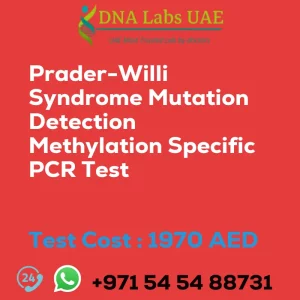Di-George Syndrome Karyotyping and FISH Test
Test Name: Di-George Syndrome Karyotyping and FISH Test
Components: Sodium heparin Vacutainer (2ml)
Price: 1650.0 AED
Sample Condition: Peripheral blood
Report Delivery: 7-10 days
Method: Cell Culture + FISH
Test Type: Genetics
Doctor: Gynecologist
Test Department: DNA Labs UAE
Pre Test Information: Di-George Syndrome (Karyotyping+FISH) can be done with a doctor’s prescription. Prescription is not applicable for surgery and pregnancy cases or people planning to travel abroad.
Test Details:
DiGeorge syndrome, also known as 22q11.2 deletion syndrome, is a genetic disorder caused by a deletion of a small piece of chromosome 22. This deletion is typically identified through karyotyping, which is a method of analyzing the chromosomes to detect any abnormalities.
In karyotyping, cells from a patient are cultured and then stained to visualize the chromosomes. The chromosomes are then arranged in pairs according to their size, shape, and banding pattern. By examining the karyotype, geneticists can identify any structural abnormalities, such as deletions, duplications, or translocations.
However, karyotyping alone may not be sufficient to detect small deletions or rearrangements, especially in the case of DiGeorge syndrome where the deletion is very small. Therefore, a more specific and sensitive technique called fluorescence in situ hybridization (FISH) is often used to confirm the diagnosis.
FISH involves using fluorescently labeled DNA probes that are complementary to the specific region of the chromosome of interest. These probes bind to the target DNA sequence, allowing visualization of the specific chromosomal region under a fluorescence microscope.
In the case of DiGeorge syndrome, FISH probes are designed to bind to the deleted region on chromosome 22. If the probes fail to bind to the target region, it confirms the presence of the deletion.
Karyotyping and FISH are complementary techniques used in combination to diagnose DiGeorge syndrome. Karyotyping provides an overview of the entire chromosome set, allowing detection of large-scale chromosomal abnormalities, while FISH provides a more targeted analysis to confirm the presence of the specific deletion associated with DiGeorge syndrome.
| Test Name | Di-George Syndrome KaryotypingandFISH Test |
|---|---|
| Components | Sodium heparin Vacutainer (2ml) |
| Price | 1650.0 AED |
| Sample Condition | Peripheral blood |
| Report Delivery | 7-10 days |
| Method | Cell Culture + FISH |
| Test type | Genetics |
| Doctor | Gynecologist |
| Test Department: | |
| Pre Test Information | Di-George Syndrome (Karyotyping+FISH) can be done with a Doctors prescription. Prescription is not applicable for surgery and pregnancy cases or people planing to travel abroad. |
| Test Details |
DiGeorge syndrome, also known as 22q11.2 deletion syndrome, is a genetic disorder caused by a deletion of a small piece of chromosome 22. This deletion is typically identified through karyotyping, which is a method of analyzing the chromosomes to detect any abnormalities. In karyotyping, cells from a patient are cultured and then stained to visualize the chromosomes. The chromosomes are then arranged in pairs according to their size, shape, and banding pattern. By examining the karyotype, geneticists can identify any structural abnormalities, such as deletions, duplications, or translocations. However, karyotyping alone may not be sufficient to detect small deletions or rearrangements, especially in the case of DiGeorge syndrome where the deletion is very small. Therefore, a more specific and sensitive technique called fluorescence in situ hybridization (FISH) is often used to confirm the diagnosis. FISH involves using fluorescently labeled DNA probes that are complementary to the specific region of the chromosome of interest. These probes bind to the target DNA sequence, allowing visualization of the specific chromosomal region under a fluorescence microscope. In the case of DiGeorge syndrome, FISH probes are designed to bind to the deleted region on chromosome 22. If the probes fail to bind to the target region, it confirms the presence of the deletion. Karyotyping and FISH are complementary techniques used in combination to diagnose DiGeorge syndrome. Karyotyping provides an overview of the entire chromosome set, allowing detection of large-scale chromosomal abnormalities, while FISH provides a more targeted analysis to confirm the presence of the specific deletion associated with DiGeorge syndrome. |








